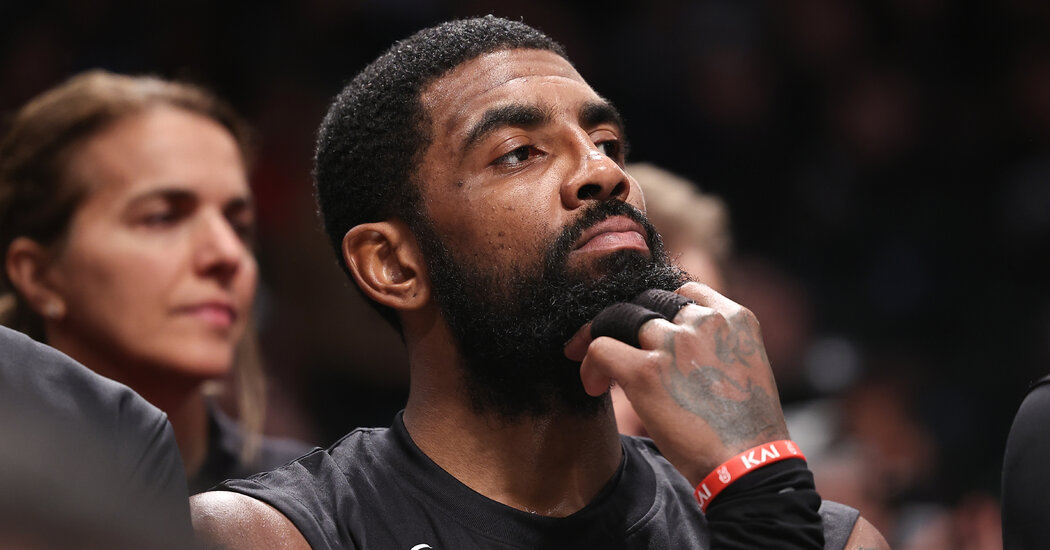The Brooklyn Nets and the Anti-Defamation League have sent a letter to Amazon asking the company to address the “deeply and unequivocally anti-Semitic” documentary and related book underlying the Brooklyn Nets’ suspension of Kyrie Irving. . The company said it was working with the ADL to investigate whether a disclaimer could be added to the film.
The letter — signed by Jonathan Greenblatt, the director of the ADL, as well as on behalf of the Nets — called on Amazon to remove or add the film and accompanying book, saying they were “designed to foment hatred and , now that it was popularized by Mr. Irving, will directly cause harm to the Jews.” A copy of the letter was obtained by The New York Times.
Cory Shields, an Amazon spokesperson, said the potential disclaimer would appear on the main page of the documentary, which viewers would see before purchasing or renting the film. A similar comment could potentially be added to a page where customers can purchase the book the film is based on.
More than a week ago, Mr. Irving tweeted a link to Amazon for a documentary called “Hebrews to Negroes: Wake Up Black America,” which features “extensive anti-Semitism,” such as claims that Jews control the media and that millions of Jews did. not die during the holocaust.
Although he deleted the tweet, Mr. Irving was suspended by the Nets for refusing to say he had no anti-Semitic views. He later apologized on Instagram for posting the documentary “without context and a factual explanation that outlined the specific beliefs in the documentary that I agreed and disagreed with.” He said he had no intention of “disregarding or perpetuating any hatred of any Jewish cultural history related to the Holocaust.”
The Nets and others said his apology didn’t go far enough.
The four-page letter, the existence of which was first noted by reporters for the Athletic, was dated Friday and addressed to Amazon executive chairman Jeff Bezos; the director, Andy Jassy; and David Zapolsky, Amazon general counsel. It describes problematic content in the book and film and discussed why it was troubling at the current time of heightened anti-Semitism in the United States.
The film was self-produced in 2018 by the director, Ronald Dalton Jr., according to the listing on Amazon, and is available to rent for $12 or to buy for $50. It has over 1,200 reviews and has been made available on Amazon via the Prime Video Direct program, a self-service platform launched in 2016 to enable filmmakers and content creators to upload their works and reach the company’s millions of customers.
The company said at the time that the service, which focuses on feature films and TV shows, “wanted to make it even easier for content creators to find an audience, and for that audience to find great content.”
Amazon will withhold half of the purchase price or rental fee and pass the remaining half on to the content provider, according to its website for filmmakers.
Mr. Greenblatt said in a statement last week that Mr. Irving’s antics drew attention and sales to the film and accompanying book, making it a multi-category bestseller on Amazon.
The company’s guidelines tell filmmakers that “all titles undergo manual and automated reviews” before it licenses them and that certain content is prohibited, such as violating copyright or explicit sexuality. Amazon also says it bans “hateful content,” such as speech that “contains derogatory comments, hate speech, or threats that specifically target a group or individuals.”
Amazon said the film was reviewed before it became available online, though it declined to provide details about the review and how it concluded the film did not violate the hate speech ban.
Its self-service distribution is similar to the self-publishing model Amazon has developed for books, allowing it to vastly expand its offerings without negotiating with publishers. Amazon has long been hesitant to remove sensitive or controversial books, though in recent years it has updated its policy to give itself the freedom to remove “offensive” content. “As a bookseller, we believe it is important to provide access to the written word, including content that may be considered offensive,” the policy states.
Sopan Deb reporting contributed.

